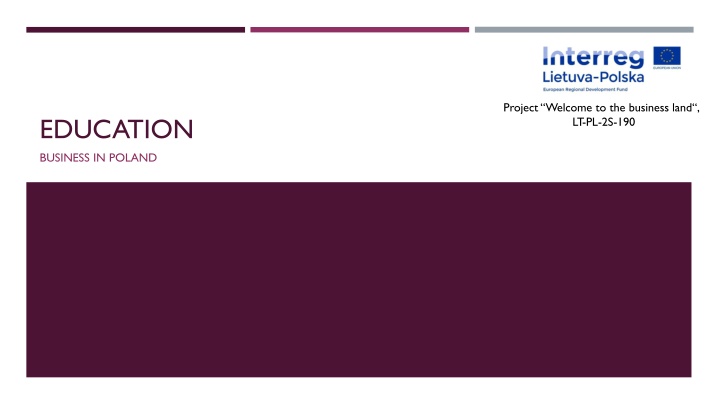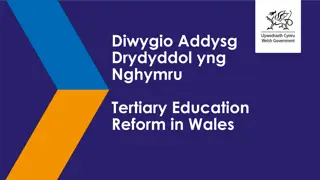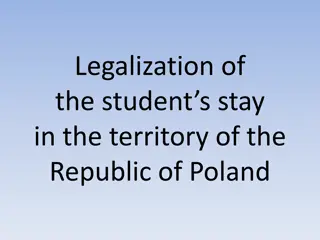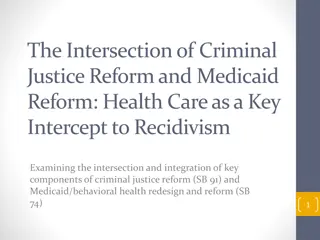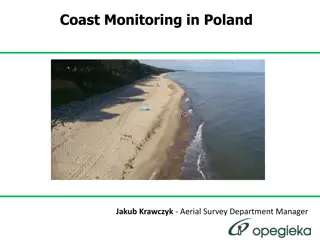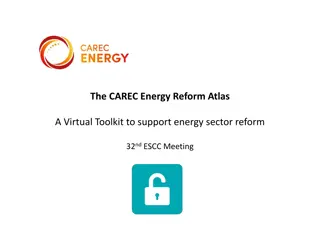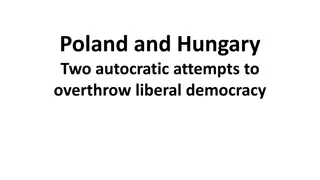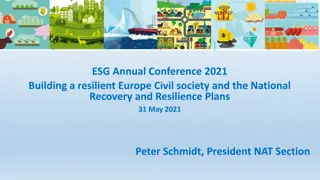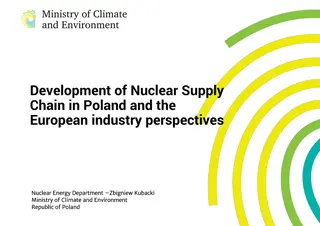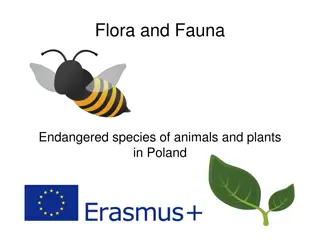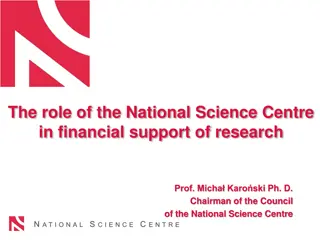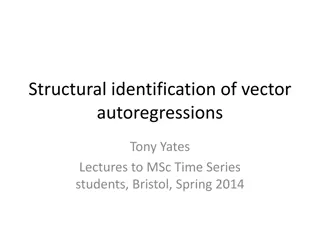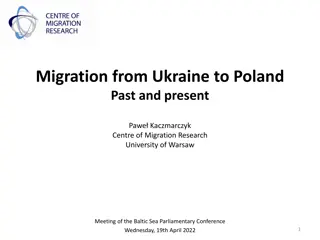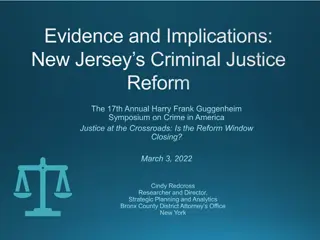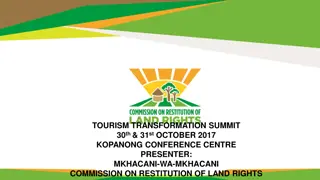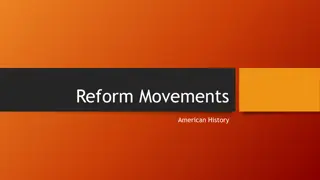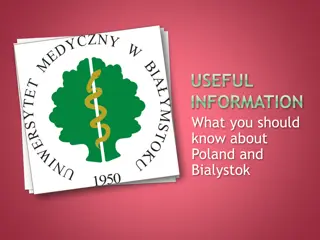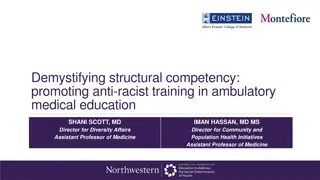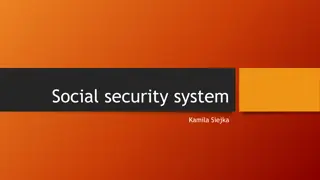Education System in Poland - Structural Reform and Stages
Full-time compulsory education in Poland lasts for 10 years, transitioning to 9 years in 2017. The educational reform introduced a new structure with primary and secondary schools, vocational education, and collaboration with the business sector to enhance skills for the labor market. Various stages of education cater to different age groups, starting from early childhood institutions to post-secondary schools.
Download Presentation

Please find below an Image/Link to download the presentation.
The content on the website is provided AS IS for your information and personal use only. It may not be sold, licensed, or shared on other websites without obtaining consent from the author.If you encounter any issues during the download, it is possible that the publisher has removed the file from their server.
You are allowed to download the files provided on this website for personal or commercial use, subject to the condition that they are used lawfully. All files are the property of their respective owners.
The content on the website is provided AS IS for your information and personal use only. It may not be sold, licensed, or shared on other websites without obtaining consent from the author.
E N D
Presentation Transcript
Project Welcome to the business land, LT-PL-2S-190 EDUCATION BUSINESS IN POLAND
EDUCATION SYSTEM IN POLAND Full-time compulsory education lasts for 10 years and comprises the last year of pre-school education, 6 years of primary school education and 3 years of lower secondary school education.Starting 2017 a new structure of school education is being implemented in which full-time compulsory education will last for 9 years (the last year of pre- school education and 8 years of primary school education). In the Polish education system full-time compulsory education and part-time compulsory education are defined. Full-time compulsory education (obligation to attend primary and lower secondary school old structure, and primary school new structure) applies to pupils aged 7 -16 years (7-15 in the new structure) while part-time compulsory education (obligation to be in education) concerns pupils aged 16-18 (15-18 in the new structure) and it may take place either in school settings (a student attends an upper secondary school) or in non-school settings (e.g.a student follows vocational training offered by employers).
STRUCTURAL REFORM IN 2017 Educational reform in Poland is being implemented since the beginning of 2017. Its main goal is to offer students a solid background of general education required for further personal development and the needs of contemporary labour market. The key elements of the reform are as follows: o change in the school structure: introduction of a long, 8-year primary school as well as 4-year general and 5-year technical secondary school, o an obligation for 6-year-olds to attend 1 year of pre-primary education in order to acquire basic skills before they start school at 7 (this education, as it is the case for the school education, is financed from the general subvention from the State budget), o provision of textbooks free of charg , o strengthening secondary education both general and vocational through the extension of secondary programmes by 1 year, o introduction of 3-year sectoralVET learning (to obtain a professional qualification) with a possibility to continue education for further 2 years at the second stage of sectoralVET school in order to upgrade qualifications and to prepare for the matriculation exam, o promotion of dual vocational training in cooperation with the business sector, o extending the participation of employers in co-financing of vocational education through the establishment of the Fund for Vocational Education Development.
STRUCTURAL REFORM IN 2017 The new structure includes: o 8-year primary school, o 4-year general secondary school, o 5-year technical secondary school, o 3-year sectoralVET school (stage I), o 2-year sectoralVET school (stage II), o 3-year special school preparing for employment, o post-secondary school.
EDUCATIONAL STAGES Institutions for children aged 0 3 years o cr che ( obek), o kids club (klub dzieci cy). Attending cr che is not obligatory, cr ches are not a part of education sustem as they are supervised by the Ministry of Family, Labour and Social Policy. Institutions for children aged 3 6 years o pre-school (przedszkole), o pre-school class in primary school (oddzia przedszkolny w szko ach podstawowych), o pre-school unit (zesp wychowania przedszkolnego), o pre-school centre (punkt przedszkolny).
PRIMARY EDUCATION After the reform of the education system in 2017, compulsory primary school education applies to pupils until 8th year of primary school. The basic criterion is the age of pupils children start a primary school when they are 7 and have completed one-year education in kindergarten. Primary schools are free of charge and pupils graduate with an exam after having completed 8th grade. It includes two stages: o grades 1- 3 (early school education), o grades 4 -8 where teaching is done by subject.
SECONDARY EDUCATION Secondary education includes: a 4-year general secondary school, a 5-year technical high school, an industry school of 1st and 2nd degree. Completion of an industry's first level school provides a basic industry education, allows to obtain a diploma confirming professional qualifications, and is prerequisite to continuing education at a second-level industry school. Graduates of a general secondary school, technical secondary school and a second-level industry school sector receive a secondary school certificate which is obligatory for taking the matriculation exam in three compulsory subjects (Polish language, maths, foreign language). In case of a secondary school and a technical secondary school, the student must also take the exam in an additional course of his choice at an advanced level.
POST -SECONDARY EDUCATION Post-secondary education is considered to be a part of a secondary education. Post-secondary schools (szko a policealna) are intended for graduates of general secondary schools who wish to obtain a diploma confirming their vocational qualifications. The schools offer courses lasting from 1 to 2.5 years.The students of post-secondary schools and students of basic vocational schools and technical secondary schools take vocational exams of the same type. Post-secondary schools will continue their functioning within the new structure of school education.
ADULT EDUCATION Education and training for adults consists of completing secondary and basic education by adults, undertaking various types of trainings raising professional and personal qualifications, as well as training for the unemployed or job seekers. It is organised, in school- and non-school settings, by: o continuing education institutions, o practical training institutions, o In-service training centres, o HEIs as non-degree postgraduate programs. Training is offered also to the unemployed and to certain categories of people searching for a job.
HIGHER EDUCATION There are two types of Higher Education Institutions: University-type (uczelnia akademicka) o Non-University-type (uczelnia zawodowa). o They both offer first- and second-cycle programmes as well as long-cycle Master s degree programs while only univeristy-type HEIs can offer third-cycle programs (doctoral studies) and are authorized to award doctoral degrees. Studies are organized int he form of full-time (studia stacjonarne) or part-time (studia niestacjonarne) programs. First-cycle programs lead to two types of degrees: licencjat (equivalent of Bachelor s degree) 3-4 year programs, o In ynier (equivalent of Bachelor s degree) 3.5-4 year programs. o Holders of the Bachelor s degree can enter second-cycle programs,which take 1.5-2 years depending on the area of study. Only several fields of study offer long-cycle Master s degree programs that last for 4-6 years.First-cycle,sceond-cycle and long-cycle Master s programs end with a diploma examination and students who have passed it are granted a relevant degree. The Master s degree (magister or its equivalent) entitles its holder to practice a given profession and provides access to thrid-cycle studies. They are organised in HEIs or research and development institutions other than HEIs and last for 3-4 years. Colleges of social work These institutions operate in the framework of school education system (not the higher education system) offering education at tertiary level (short-cycle higher education).
UNIVERSITIES IN POLAND Name Location 1. Uniwersytet Warszawski Warsaw 2. Uniwersytet Jagiello ski Cracow 3. Politechnika Warszawska Warsaw 4. Akademia G rniczo-Hutnicza Cracow 5. Uniwersytet im. Adama Mickiewicza Poznan 6. Uniwersytet Wroc awski Wroclaw 7. Uniwersytet Miko aja Kopernika w Toruniu Torun 8. Politechnika Wroclawska Wroclaw 9. Uniwersytet Marii Curie-Sklodowskiej w Lublinie Lublin 10. Uniwersytet Slaski w Katowicach Katowice 11. Uniwersytet Gdanski Gdansk 12. Katolicki Uniwersytet Lubelski Jana Pawla II Lublin 13. Politechnika Poznanska Poznan 14. Politechnika Gdanska Gdansk 15. Politechnika Krakowska Cracow
UNIVERSITIES IN POLAND Name Location 16. Politechnika Rzeszowska im. Ignacego Lukasiewicza Rzeszow 17. Politechnika Slaska w Gliwicach Gliwice 18. Uniwersytet Lodzki Lodz 19. Politechnika Lodzka Lodz 20. Warszawski Uniwersytet Medyczny Warsaw 21. Szkola Glowna Handlowa w Warszawie Warsaw 22. Uniwersytet Warminsko-Mazurski w Olsztynie Olsztyn 23. Szkola Glowna Gospodarstwa Wiejskiego w Warszawie Warsaw 24. Uniwersytet Ekonomiczny w Krakowie Cracow 25. Politechnika Opolska Opole
SOURCES The Polish Education System in Brief 2017/18 https://eurydice.org.pl/ System O wiaty w Polsce https://pl.wikipedia.org/wiki/System_o%C5%9Bwiaty_w_Polsce
About the project The project Welcome to the business land (LT-PL-2S-190) is aimed at showing the border region youth that Business can be simple, if you have a good idea, some support from professionals and general knowledge on business processes. During its implementation, it is planned to organize business leader s competition and International Economic Forum and to activate partnership of project beneficiaries and social partners (schools, business companies, professional development centers). This training material has been produced with the financial assistance of the European Union. The contents of this training material are the sole responsibility of PI PVC and Euroregion Niemen Association and can under no circumstances be regarded as reflecting the position of the European Union. Total projects size is 49 973, 25 EUR. Out of them co-funding of European Regional Development Fund is 42 477,25EUR. This project is Partly financed from the European Regional Development Fund Interreg V-A Lithuania-Poland cooperation programme www.bonusLT-PL.eu
